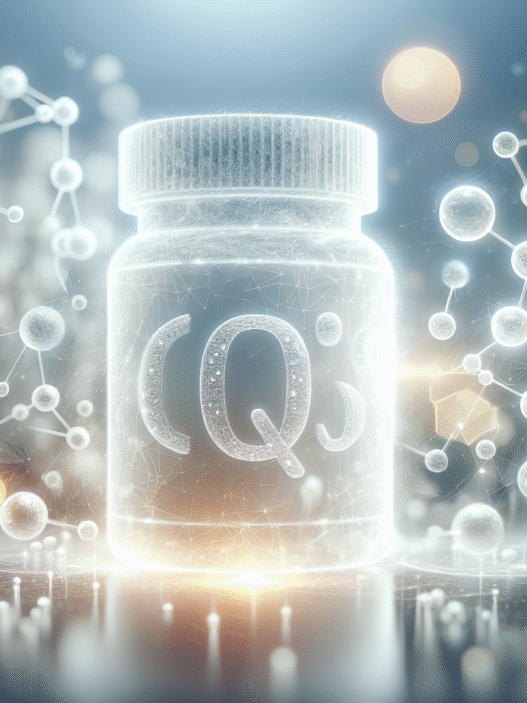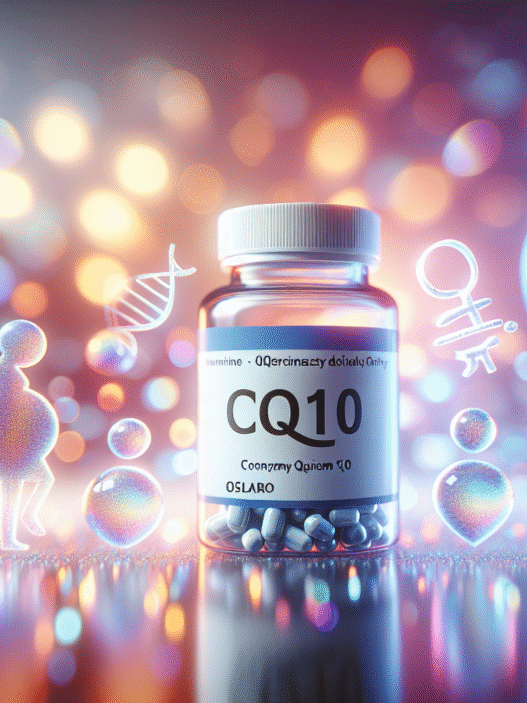Understanding CoQ10
Introduction to Coenzyme Q10
Coenzyme Q10, commonly referred to as CoQ10, is a vital compound found throughout the body, with the highest concentrations in the heart, liver, kidney, and pancreas (Healthline). It is synthesized in the inner membrane of mitochondria, the powerhouse of cells. CoQ10 plays a crucial role in the electron transport chain and ATP production, which is essential for cellular energy generation.
Besides its primary function in energy production, CoQ10 serves as a potent antioxidant, protecting cells from oxidative stress and free radicals. This antioxidative property is particularly beneficial for aging and vitality.
Importance of CoQ10 in the Body
The importance of CoQ10 extends to various bodily functions and overall health. CoQ10 is integral in the following processes:
-
Energy Production: It helps generate adenosine triphosphate (ATP), the cell’s main energy source.
-
Antioxidant Protection: By neutralizing free radicals, CoQ10 protects cells from oxidative damage, which can lead to chronic diseases and accelerate the aging process.
-
Heart Health: CoQ10 might help prevent or treat certain heart conditions, including congestive heart failure and coronary artery disease. Research indicates that CoQ10 can improve heart function by increasing energy production and reducing oxidative stress.
-
Fertility: CoQ10 can aid in improving egg and sperm quality, potentially boosting fertility. It helps to stop and reverse the decline in egg quantity and quality with age, and enhances sperm activity and concentration (WebMD).
-
Neuroprotective Effects: CoQ10 may play a role in preventing neurodegenerative diseases, such as Alzheimer’s and Parkinson’s disease, by reducing oxidative damage in the brain (NCBI).
| Function | CoQ10 Role |
|---|---|
| Energy Production | Generates ATP, the main energy source for cells |
| Antioxidant Protection | Neutralizes free radicals and protects against oxidative stress |
| Heart Health | Improves heart function, potentially aids in treating heart conditions |
| Fertility | Enhances egg and sperm quality, aiding fertility |
| Neuroprotection | May help prevent neurodegenerative diseases by reducing oxidative damage in the brain |
CoQ10 levels naturally decrease with age and are lower in individuals with certain health conditions, such as heart disease, as well as those taking statins (Mayo Clinic). Considering its benefits, supplementing with CoQ10 could be advantageous, especially for those concerned with aging and vitality.
For more information on how to supplement with CoQ10, visit our article on best CoQ10 supplements and explore its various forms and sources. Additionally, you can check how CoQ10 impacts mitochondrial function and learn about its antioxidant benefits.
Benefits of CoQ10
Coenzyme Q10, or CoQ10, plays a vital role in maintaining overall health, particularly as one ages. This section explores the diverse benefits of CoQ10, including its impact on heart health, migraine prevention, and brain function.
Heart Health Benefits
CoQ10 is essential for heart health, primarily due to its role in producing energy and reducing oxidative stress. According to WebMD, CoQ10 can improve symptoms and decrease the risk of heart-related complications in individuals with heart diseases.
CoQ10 has been shown to:
- Improve heart function in individuals with heart failure.
- Lower high blood pressure.
- Reduce oxidative stress.
| Benefit | Effect |
|---|---|
| Heart failure | Improves symptoms and reduces risk of complications |
| High blood pressure | Lowers blood pressure |
| Oxidative stress | Reduces cell damage |
For those looking to supplement, visit our article on the best coq10 supplements.
Role of CoQ10 in Migraine Prevention
Many adults suffer from migraine headaches, and CoQ10 has shown promising results in reducing migraine frequency. By enhancing mitochondrial function and reducing oxidative stress, CoQ10 helps alleviate the severity and occurrence of migraines. According to the Mayo Clinic, CoQ10 can be an effective treatment for migraines.
For additional reading on CoQ10’s impact on migraine prevention, see coq10 antioxidant benefits.
Effects on Brain Health
The role of CoQ10 in brain health is another significant benefit. Preliminary studies indicate that CoQ10 may slow the progression of neurodegenerative diseases like Alzheimer’s disease and Parkinson’s disease by reducing harmful compounds and enhancing mitochondrial function.
| Condition | Potential Benefit |
|---|---|
| Alzheimer’s disease | May slow disease progression |
| Parkinson’s disease | Reduces harmful compounds and oxidative stress |
For more insights on CoQ10 and cellular health, refer to coq10 and mitochondrial function.
By understanding the wide array of benefits that CoQ10 offers, particularly for heart health, migraines, and brain health, one can make informed decisions about incorporating this powerful antioxidant into their health routine. For a deeper dive into CoQ10’s impact on aging and vitality, explore our articles on coq10 anti-aging properties and coq10 for skin elasticity.
CoQ10 and Age-Related Concerns
Impact of CoQ10 Levels with Age
As people age, the levels of Coenzyme Q10 (CoQ10) in the body tend to decrease. This decline can be more pronounced in individuals with certain health conditions, such as heart disease, and in those who take cholesterol-lowering drugs known as statins. Reduced levels of CoQ10 can impact various bodily functions, including energy production and protection against oxidative stress.
| Age Group | Average CoQ10 Level (µg/mL) |
|---|---|
| 20-30 | 1.70 |
| 40-50 | 1.42 |
| 60-70 | 1.11 |
| 80+ | 0.86 |
Higher blood levels of CoQ10 in aging individuals are associated with increased physical activity and lower levels of oxidative stress. This has potential implications for preventing heart disease and cognitive decline. For more details on how CoQ10 supports mitochondrial function, you can read our article on CoQ10 and Mitochondrial Function.
CoQ10 and Anti-aging Effects
CoQ10 is increasingly recognized for its anti-aging properties. Its ability to combat oxidative stress makes it a vital component in maintaining cellular health and vitality. In older adults, CoQ10 supplements may improve muscle strength, vitality, and physical performance. This can have a direct impact on the overall quality of life, supporting activities of daily living and reducing the risk of age-related frailty.
CoQ10’s role in skin health further underscores its anti-aging potential. By reducing harmful compounds that can affect memory, cognition, and physical functions, CoQ10 helps maintain youthful skin elasticity and reduce wrinkles. For more insights, see our articles on CoQ10 and Wrinkles and CoQ10 Skin Care Products.
| Benefits | Description |
|---|---|
| Muscle Strength | Improves physical performance and vitality |
| Skin Health | Reduces wrinkles, improves skin elasticity |
| Cognitive Function | Potentially reduces harmful compounds affecting memory and cognition |
For those interested in CoQ10 supplementation to support aging, it’s important to know the optimal dosages for different conditions. Visit our article on CoQ10 Dosage for Anti-aging for detailed guidelines. Always consult a healthcare provider before starting any new supplement regimen, especially when it comes to managing age-related concerns.
For further information on natural sources of this vital compound, refer to our page on Natural Sources of CoQ10.
CoQ10 for Specific Conditions
CoQ10 in Heart Conditions
Coenzyme Q10 (CoQ10) has shown significant benefits for individuals with heart-related conditions. This powerful antioxidant is known for its ability to support overall heart health by aiding in the production of cellular energy. CoQ10 is especially beneficial for those suffering from heart failure, angina, and hypertension.
Studies have demonstrated that CoQ10 may reduce muscle pain associated with statin treatment for high cholesterol and help manage high blood pressure. In addition, CoQ10 can improve symptoms of congestive heart failure, potentially allowing some patients to reduce their dosage of conventional medications.
| Heart Condition | Potential Benefit of CoQ10 |
|---|---|
| Heart Failure | Improved symptoms, reduced medical dosage |
| Angina | Reduced frequency and severity of chest pain |
| Hypertension | Improved blood pressure management |
| High Cholesterol | Reduced statin-related muscle pain |
For detailed guidance on the best supplements for heart health, refer to our guide on best coq10 supplements.
CoQ10 for Neurodegenerative Diseases
CoQ10’s role extends to supporting brain health and managing neurodegenerative diseases such as Parkinson’s disease, Alzheimer’s disease, and Huntington’s disease. Its primary function is to reduce oxidative stress and inflammation, both of which are critical factors in the progression of these conditions.
Supplementation with CoQ10 has shown promise in slowing the progression of Parkinson’s disease and improving mitochondrial function (NCBI). For Alzheimer’s patients, CoQ10 may help protect against cognitive decline by reducing oxidative damage.
| Neurodegenerative Disease | Effect of CoQ10 |
|---|---|
| Parkinson’s Disease | Slows disease progression, improves mitochondrial function |
| Alzheimer’s Disease | Protects against cognitive decline, reduces oxidative damage |
| Huntington’s Disease | Potential reduction in symptoms, oxidative stress mitigation |
For further information on how CoQ10 impacts brain health, see our article on coq10 and mitochondrial function.
CoQ10 in Diabetes Management
CoQ10 is also beneficial for managing diabetes by improving insulin sensitivity, reducing blood sugar levels, and enhancing overall metabolic health. Research indicates that CoQ10 supplementation can positively impact triglyceride levels, serum insulin levels, insulin resistance, and antioxidant capacity in patients with type 2 diabetes and metabolic syndrome (NCBI).
Additionally, CoQ10 is effective in reducing oxidative stress and inflammatory markers in patients with diabetic neuropathy (NCBI). This multifaceted approach makes CoQ10 an important supplement for those looking to manage their diabetes more effectively.
| Diabetes Management Aspect | Benefit of CoQ10 |
|---|---|
| Insulin Sensitivity | Improved sensitivity, reduced resistance |
| Blood Sugar Levels | Enhanced control, lower levels |
| Triglyceride Levels | Lowered levels, better cardiovascular health |
| Diabetic Neuropathy | Reduced oxidative stress, decreased inflammation |
To learn more about how CoQ10 can benefit your metabolic health, explore our article on natural sources of coq10.
By understanding the significant benefits of CoQ10 for these specific conditions, individuals can better manage their health and enhance their overall well-being. Always consult with a healthcare professional before starting any new supplement regimen to ensure safety and effectiveness. For more on CoQ10 and aging, visit our article on coq10 and the aging process.
Supplementing with CoQ10
Understanding how to effectively supplement with CoQ10 can maximize its potential health benefits, especially for those concerned with heart health and aging. This section outlines the optimal dosages for different health conditions and discusses potential interactions with medications.
Optimal Dosages for Different Conditions
CoQ10 is utilized for a range of health concerns, including improved aging, exercise performance, heart health, diabetes, fertility, and migraines. Here is a guide to recommended CoQ10 dosages for various conditions:
| Condition | Recommended Dosage (mg/day) |
|---|---|
| General Health | 100 – 200 |
| Heart Failure and Angina | Up to 200 |
| Hypertension | 100 – 200 |
| Migraine Prevention | 100 |
| Diabetes Management | 200 – 300 |
For heart conditions like heart failure and angina, studies indicate that up to 200 mg per day can be effective in reducing symptoms and improving overall heart health (Healthline). Additionally, patients with hypertension may benefit from CoQ10 supplementation, resulting in significant reductions in systolic blood pressure (NCBI).
For more information on optimizing your CoQ10 supplementation, visit our detailed guide on coq10 dosage for anti-aging.
Potential Interactions with Medications
While CoQ10 is generally safe, it’s crucial to be aware of its potential interactions with certain medications. Some important interactions to consider include:
- Anticoagulants (Warfarin): CoQ10 may reduce the effectiveness of blood-thinning medications.
- Chemotherapy Drugs: There is concern that CoQ10 might decrease the effectiveness of some chemotherapy medications.
- Blood Pressure Medications: CoQ10 can lower blood pressure, which may have a compounded effect if taken with antihypertensive drugs.
| Medication | Potential Interaction |
|---|---|
| Warfarin | Reduced effectiveness |
| Chemotherapy Drugs | Decreased efficacy |
| Antihypertensive Drugs | Additional blood pressure lowering |
For safety, always consult your healthcare provider before starting CoQ10, especially if you’re on any of these medications. For more insights into the benefits of CoQ10 and optimal supplementation practices, explore our articles on coq10 for anti-aging skincare and coq10 and cellular health.
Safety and Considerations
When considering the use of CoQ10 supplements, it’s essential to understand the safety measures and potential side effects. This section will cover the side effects, sources and forms, and considerations for CoQ10 use during pregnancy and breastfeeding.
Side Effects and Precautions
CoQ10 supplements are generally safe and have minimal side effects when consumed as recommended. According to the Mayo Clinic, potential mild side effects might include digestive problems like nausea, diarrhea, and stomach upset (Mayo Clinic). However, more severe side effects could occur, although they are rare.
It’s vital for individuals taking statin-type cholesterol drugs to consult with their healthcare provider before starting CoQ10 supplements, as minor interactions may happen. For those with specific heart conditions or those prone to migraines, CoQ10 might offer additional benefits (Mount Sinai). Always follow dosing recommendations and speak with a healthcare provider if any adverse effects are experienced.
CoQ10 Sources and Forms
CoQ10 can be obtained from various dietary sources as well as supplement forms. Foods rich in CoQ10 include:
- Fatty fish (such as salmon, mackerel, and tuna)
- Organ meats (like liver and heart)
- Whole grains
- Nuts and seeds
CoQ10 supplements are available in different forms, typically as ubiquinone or ubiquinol. Ubiquinol is the more active, antioxidant form and is more easily absorbed by the body. For more on how to get CoQ10 from food, see our article on natural sources of CoQ10.
CoQ10 in Pregnancy and Breastfeeding
The safety of using CoQ10 during pregnancy and breastfeeding is not yet well-established. It is advised not to use CoQ10 in these conditions without a doctor’s approval. Pregnant and breastfeeding women should exercise caution and consult their healthcare provider to weigh the benefits and potential risks of taking CoQ10 during these periods.
For those concerned with how CoQ10 fits into their overall anti-aging and vitality regimen, exploring comprehensive information on best coq10 supplements and coq10 dosage for anti-aging can be helpful. Make sure to also consider CoQ10’s benefits for skin and vitality by examining its role in coq10 and skin health and coq10 antioxidant benefits.
Understanding and adhering to safety considerations while using CoQ10 can unlock its numerous benefits, especially in relation to heart health and anti-aging. For more insights and tips on incorporating CoQ10 into your health regimen, visit our coq10 supplements for energy article.





















